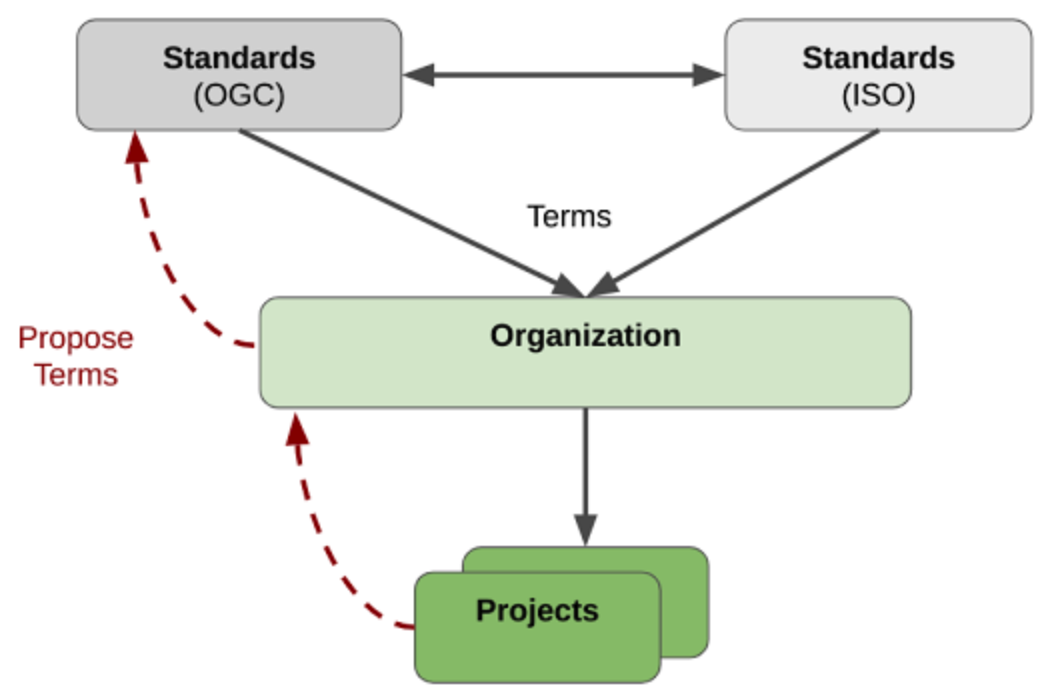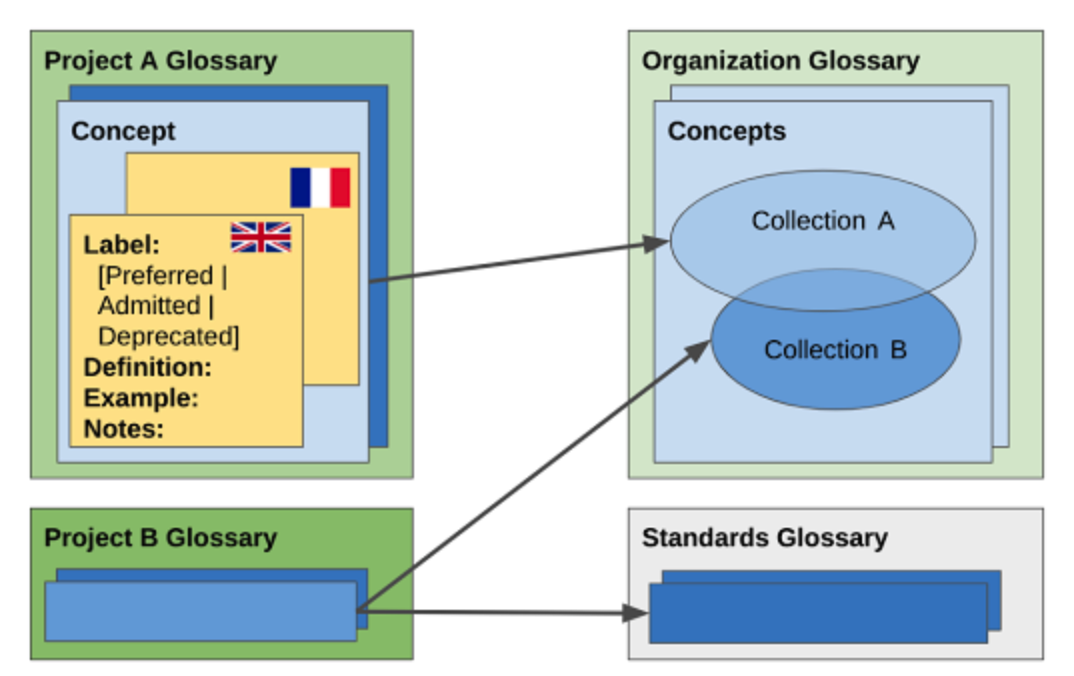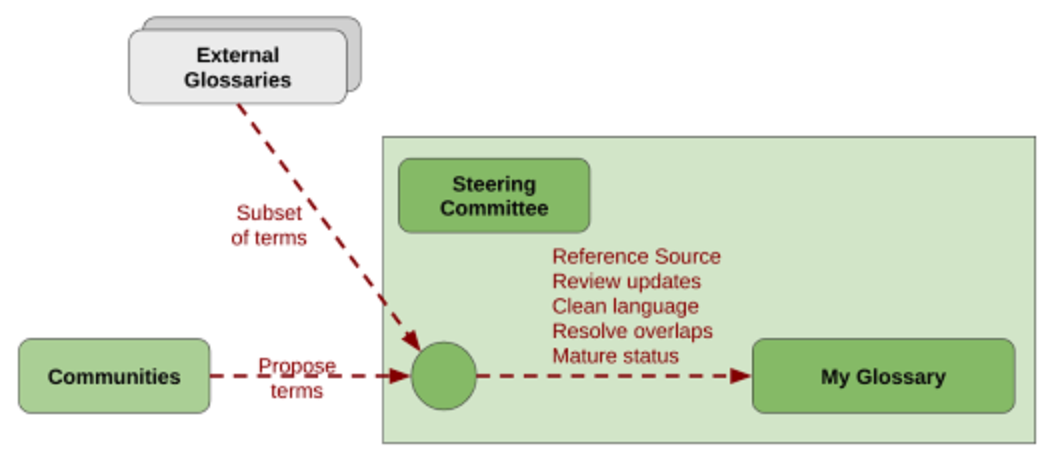Difference between revisions of "Glossary-Project"
(Code of Conduct) |
|||
| (5 intermediate revisions by 2 users not shown) | |||
| Line 12: | Line 12: | ||
=== Sharing Terms === | === Sharing Terms === | ||
We’ve been working on how to share terms between glossaries. | We’ve been working on how to share terms between glossaries. | ||
| − | [[File:Sharing terms.png| | + | |
| + | [[File:Sharing terms.png|400px|alt=Sharing terms between organizations]] | ||
| + | |||
=== Information Schemas === | === Information Schemas === | ||
We’ve been establishing standardized information structures. | We’ve been establishing standardized information structures. | ||
| − | [[File:Information schema.png| | + | |
| + | [[File:Information schema.png|400px|alt=Glossary schema elements]] | ||
| + | |||
=== Governance === | === Governance === | ||
We’ve been working on governance models that projects can adopt. | We’ve been working on governance models that projects can adopt. | ||
| − | [[File:Governance real.png| | + | |
| + | [[File:Governance real.png|600px|alt=Glossary governance processes]] | ||
| + | |||
=== Open-source software tooling === | === Open-source software tooling === | ||
For building better cross-organizational glossaries, we are using [https://www.glossarist.org/ Glossarist]: an open-source tool to create, maintain, and update glossaries hassle-free. Glossarist is already in use by the ISO/TC 211 spatial standards body. | For building better cross-organizational glossaries, we are using [https://www.glossarist.org/ Glossarist]: an open-source tool to create, maintain, and update glossaries hassle-free. Glossarist is already in use by the ISO/TC 211 spatial standards body. | ||
=== OSGeo Terminology === | === OSGeo Terminology === | ||
| − | We’ve established an initial [https://osgeodev.geolexica.org/ GeoLexica glossary] covering English terminology used within OSGeo. | + | We’ve established an initial [https://osgeodev.geolexica.org/ GeoLexica glossary] covering English terminology used within OSGeo. |
| + | |||
| + | == Umbrella project == | ||
| + | |||
| + | The cross-organizational glossary project is a bit unusual in that it is acting as an umbrella project, with much of the generated material being deliberately kept inside other projects. | ||
| + | |||
| + | Projects include: | ||
| + | |||
| + | * [https://osgeo.geolexica.org/concepts/ Geospatial glossary terms], compiled by our team. | ||
| + | * [https://github.com/thegooddocsproject/templates The Good Docs Project templates repository], where the glossary template will fit. | ||
| + | * [https://github.com/OSGeo/OSGeoLive-doc Docs repository for the OSGeo-Live] distribution, where we intend to add glossary entries. | ||
| + | * [https://github.com/glossarist Glossarist github repository], which stores the glossary software. | ||
| + | * [https://docs.google.com/document/d/1yzncnQB7uYktPnAQ4DqZYVPDdYnqDrWmqHzcpXrjkPg/edit Minutes from weekly meetings].\== License | ||
| − | == | + | ==License== |
| − | + | The open source licenses being used by us and these projects for documentation include: | |
| − | + | * [https://creativecommons.org/licenses/by/4.0/ CC-By] | |
| − | + | * [https://opensource.org/licenses/0BSD Zero BSD] | |
| − | |||
| − | |||
| − | |||
| − | |||
| − | |||
| − | |||
| − | |||
| − | |||
| − | |||
== Next Steps == | == Next Steps == | ||
| Line 43: | Line 52: | ||
* Build a community that defines and manages geospatial terms across multiple geospatial projects and communities. | * Build a community that defines and manages geospatial terms across multiple geospatial projects and communities. | ||
* Set up processes collated in explanations and how-tos which are easy-to-follow by everyday people wanting to stand up an interoperable glossary. | * Set up processes collated in explanations and how-tos which are easy-to-follow by everyday people wanting to stand up an interoperable glossary. | ||
| + | |||
| + | We have applied to [https://wiki.osgeo.org/wiki/Season_Of_Docs_2021_Proposal Google Season of Docs 2021] which would help with achieving these objectives. | ||
== More Info == | == More Info == | ||
| Line 54: | Line 65: | ||
* Help research and then document best practices in glossary management. | * Help research and then document best practices in glossary management. | ||
* Help with whatever dirty work is required to keep the project moving forward. | * Help with whatever dirty work is required to keep the project moving forward. | ||
| + | |||
| + | == Code of Conduct == | ||
| + | We are respectful to each other, and welcoming, in line with [https://www.osgeo.org/code_of_conduct/ | OSGeo's Code of Conduct] policies. | ||
Latest revision as of 21:21, 26 March 2021
The OSGeo glossary project is building processes and tools for setting up cross-domain, inter-operable glossaries. The focus is initially on OSGeo and spatial projects, but the patterns will be equally applicable and usable within other domains as well.
Goals
Glossaries are easy to set up for simple examples but extremely hard to scale - especially when trying to inherit terms from other organizations. The collaborative overhead becomes overwhelming. Communities struggle to agree upon:
- Term definitions,
- Field and sentence structure,
- Tooling,
- Governance, and more.
Challenges
Here we cover some of the key challenges we’ve been working through.
Sharing Terms
We’ve been working on how to share terms between glossaries.
Information Schemas
We’ve been establishing standardized information structures.
Governance
We’ve been working on governance models that projects can adopt.
Open-source software tooling
For building better cross-organizational glossaries, we are using Glossarist: an open-source tool to create, maintain, and update glossaries hassle-free. Glossarist is already in use by the ISO/TC 211 spatial standards body.
OSGeo Terminology
We’ve established an initial GeoLexica glossary covering English terminology used within OSGeo.
Umbrella project
The cross-organizational glossary project is a bit unusual in that it is acting as an umbrella project, with much of the generated material being deliberately kept inside other projects.
Projects include:
- Geospatial glossary terms, compiled by our team.
- The Good Docs Project templates repository, where the glossary template will fit.
- Docs repository for the OSGeo-Live distribution, where we intend to add glossary entries.
- Glossarist github repository, which stores the glossary software.
- Minutes from weekly meetings.\== License
License
The open source licenses being used by us and these projects for documentation include:
Next Steps
In 2021 and onwards, we aim to achieve the following:
- Create best practices in cross-domain glossary management, for adoption by the open-source and technical writing communities.
- Build a community that defines and manages geospatial terms across multiple geospatial projects and communities.
- Set up processes collated in explanations and how-tos which are easy-to-follow by everyday people wanting to stand up an interoperable glossary.
We have applied to Google Season of Docs 2021 which would help with achieving these objectives.
More Info
To know more about the project, refer to our project manifesto or read about our pilot project.
Point of Contact
We communicate on the OSGeo Lexicon email list. (Note: After subscribing, check your email spam for your subscription confirmation email. It is sent straight after subscribing. Or ask cameron . shorter AT gmail .com for help.)
Want to be a part of our community?
If you wish to be a part of this challenging glossary management project, then please reach out to us through our mailing list or our slack channel:
- Try setting up your own glossary using the tools and processes we are establishing. Help us improve the process.
- Help research and then document best practices in glossary management.
- Help with whatever dirty work is required to keep the project moving forward.
Code of Conduct
We are respectful to each other, and welcoming, in line with | OSGeo's Code of Conduct policies.


